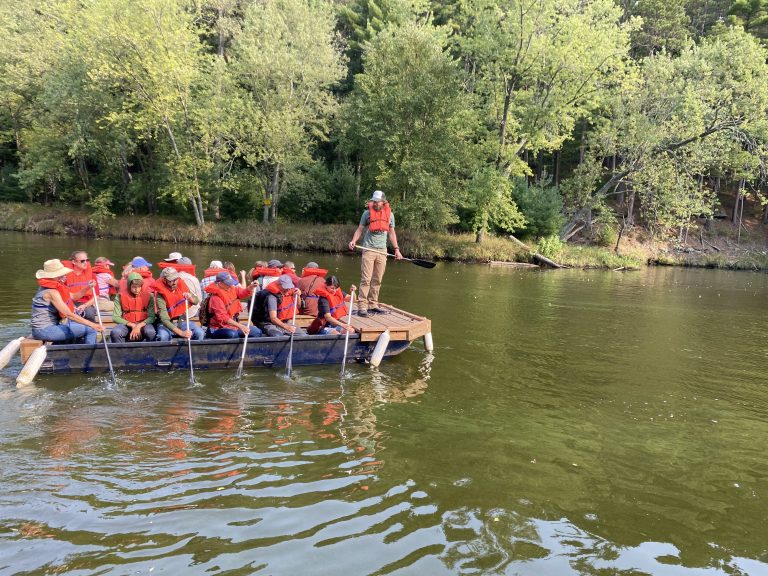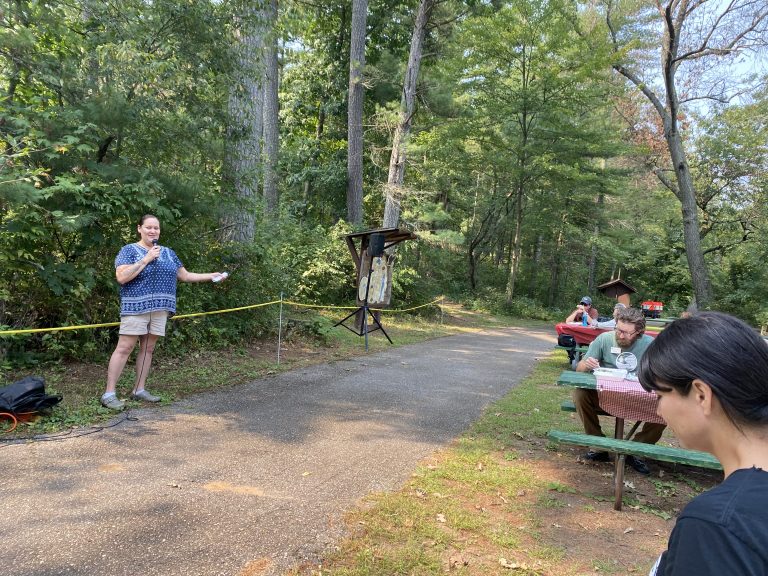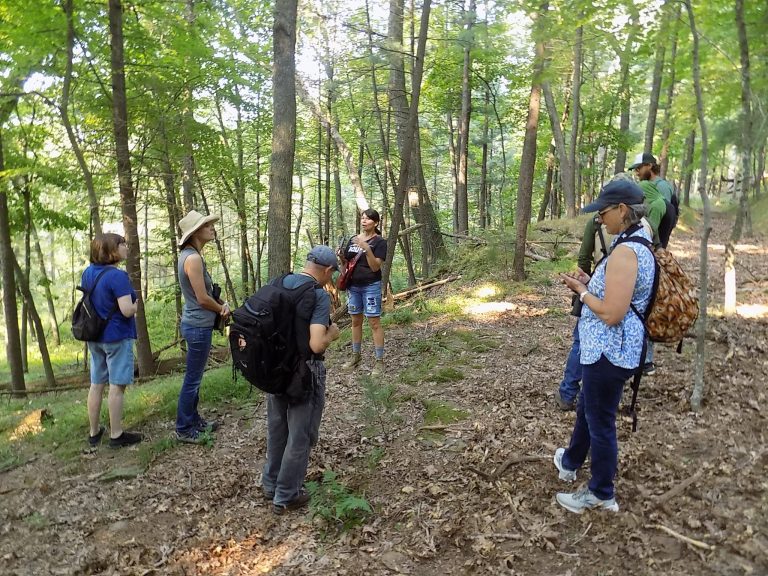Jennifer Loveland describes the Upham Woods Outdoor Learning Center as a place of “firsts.”

“The first time you speak in public in front of people. The first time you are someplace outside in the dark, which a lot of kids don’t experience. The first time you shoot a bow and arrow and figure out you really like it. A lot of the first times kids try things or do things away from home is when they’re here.”
On Saturday, September 11, 2021, Upham Woods Outdoor Learning Center celebrated 80 years of providing environmental and leadership education to youth across Wisconsin. That’s a lot of firsts. Loveland, the office operations associate for Upham Woods, is familiar with how difficult it can be to try something new—but also how rewarding. She attended Upham as both a camper and counselor when she was in 4-H.
“That summer camp nervousness is real—trying to make friends and all of that. It was good for me to try that even though a lot of the time you feel scared or nervous. When you do something like that, the next thing feels easier.”
Jennifer Loveland describes the Upham Woods Outdoor Learning Center as a place of “firsts.”
“The first time you speak in public in front of people. The first time you are someplace outside in the dark, which a lot of kids don’t experience. The first time you shoot a bow and arrow and figure out you really like it. A lot of the first times kids try things or do things away from home is when they’re here.”
On Saturday, September 11, 2021, Upham Woods Outdoor Learning Center celebrated 80 years of providing environmental and leadership education to youth across Wisconsin. That’s a lot of firsts. Loveland, the office operations associate for Upham Woods, is familiar with how difficult it can be to try something new—but also how rewarding. She attended Upham as both a camper and counselor when she was in 4-H.
“That summer camp nervousness is real—trying to make friends and all of that. It was good for me to try that even though a lot of the time you feel scared or nervous. When you do something like that, the next thing feels easier.”
Learning About the Land
Located along the Wisconsin River just north of the Dells, the land that is now Upham Woods was donated by sisters Elizabeth Upham Davis and Caroline Upham Hughes in 1941. As children the sisters enjoyed summers along the river and wanted to preserve the land as “an outdoor laboratory and camp for youth.” Today, Upham Woods provides outdoor education to young people across the state, including those from 4-H and school groups, as well as adults.

Upham Woods also resides on ancestral Ho-Chunk lands, and during the celebration, attendees had the opportunity to learn about the tribe’s relationship with this place. Carly Lincoln, bird enthusiast and author of 50 Things to Know About Birds in Wisconsin, led a bird-themed hike around Blackhawk Island and helped hikers identify birds as she discussed their personalities and relationship with the Ho-Chunk.
Attendees also celebrated the land through their tastebuds. Elena Terry, the executive chef and founder of Wild Bearies, a nonprofit that connects communities with ancestral foods, prepared a locally grown lunch: a three-sisters stew of squash, corn and beans; blue corn muffins; a wild rice and quinoa salad; fresh tomatoes; and wintergreen iced tea. Terry gathered the wintergreen herself on the island, giving attendees the opportunity to connect more deeply with the place they had come to celebrate.
Looking Forward
While Upham’s commitment to connecting youth with the land has not changed during its 80 years, its programming has evolved to include more STEM education. Youth are encouraged to see themselves as scientists, using tools such as infrared thermometers and portable microscopes to observe and document their surroundings.
Loveland notes that science can be as simple as asking a question.
“You are a scientist if you are on the island and you wonder out loud about why that tree looks that way or why do you think that would grow here. It’s exposing kids to this idea that science is something you can do.”
Making science accessible and inclusive is an ongoing focus of Upham’s work. The 80th-anniversary event and meal were supported in part by the Humanities Education for Anti-racism Literacy (HEAL), a project funded by the Andrew W. Mellon Foundation that aims to advance antiracist practices and pedagogy in science, technology, engineering, mathematics, and medicine. HEAL also seeks to address the lack of awareness of the histories of racism in academic disciplines, especially in scientific disciplines, as well as the lack of diverse representation.

Dr. Justin Hougham, the director of Upham Woods, leads a sub-project team within HEAL called “Environmental Justice Participatory Action Research.” The project explores the role of off-campus learning venues in addressing racism, diversity, equity, and inclusion in field experiences and science education. On October 28, Dr. Hougham will join a panel discussion that explores the goals of the project. All are welcome to attend.
The community is also invited to participate in a guided nature hike on October 23 as part of the statewide Wisconsin Science Festival. Participants will have the opportunity to explore and identify plants and animals and record their findings using the iNaturalist app. The event is open to both adults and kids—no experience necessary.
Although the pandemic has changed the way Upham Woods has delivered programming over the last year, Jennifer Loveland emphasizes that the objective remains the same, as it has since 1941.
“It is a goal to be that unique experience, that touchstone experience that you remember your whole life. I think a lot of that happens here. I doubt that has changed in 80 years.”
Learn more about HEAL and the panel discussion on October 28, 2021: https://sts.wisc.edu/event/panel-on-heal/
Special thanks to Jennifer Loveland and Rachael Lewandowski-Sarette for sharing their experiences.

